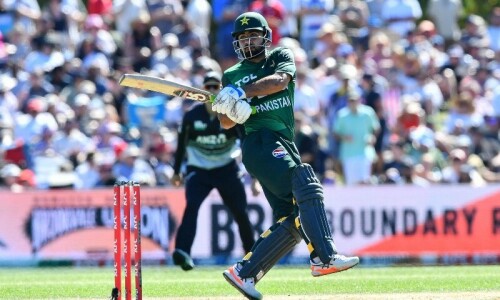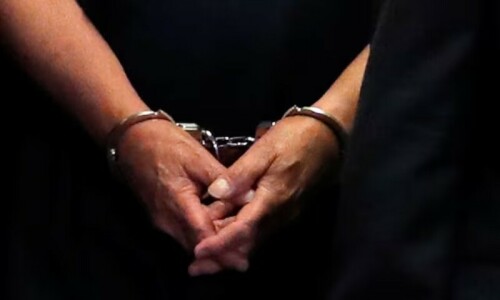THE Imran Khan government’s denouement raises the question of how he ended up facing a vote of no-confidence. Although that parliamentary process was subverted and a constitutional crisis ensued it will still mark an end to his rule. Few governments in Pakistan’s recent history began their term with Khan’s advantages. He had unqualified support from the military, widespread public goodwill, control of Punjab, a divided and demoralised opposition and a popular yearning for change. But few governments so quickly underwhelmed its supporters and disappointed others by its underperformance, unkept promises, polarising politics and Trumpian conduct.
A combination of factors may explain why Khan’s government faced a crisis of confidence that eventually cut short its term. The first undoubtedly was the pretence by a minority government that it had a decisive mandate and could rule unilaterally, riding roughshod over the views and interests of other political actors. Heading a coalition government should have involved humility and efforts at consensus building, compromise and listening to allies. Instead, Imran Khan chose to govern without consensus, ignoring Pakistan’s federal reality and a parliamentary system that needs give and take to make it work.
This was compounded by the intensely personalised nature of governance in which power was concentrated in one person, who took key decisions on his own rather than on the basis of well-considered advice. Personalised governance meant reliance on the instincts and ego of the leader rather than an institutional process of policy advice. This led to repeated, embarrassing policy U-turns and fed the image of a whimsical government muddling through, with little sense of direction. Some of this could be attributed to Khan’s inexperience and unfamiliarity with statecraft. But even in his fourth year his non-consultative and arrogant style persisted which blindsided him to rising public disillusionment with his performance and disenchantment in his own party.
Hubris, erratic governance, intolerance of opposition and polarising politics marked PTI’s rule.
A third factor was the weak leadership Khan selected to run Punjab despite his own party’s misgivings. This became his government’s Achilles heel. Its poor performance produced growing internal party discord and contributed significantly to PTI losing political ground in the province and to the rising number of dissidents who were to become politically consequential to the opposition’s no-confidence move. Lack of governance at the centre also contributed to political setbacks for the ruling party in successive by-elections. But rather than examine the reasons for defeats suffered in elections for national seats and in local polls the prime minister spent more time delivering morality lectures and religious sermons.
The party was left disorganised, factionalised and ill-disciplined. Political management remained a skill unlearnt by the top leadership not least because it relied on the establishment to mobilise majorities to pass legislation in parliament and keep coalition allies in line. But there were limits to this. Khan’s refusal to find time, much less respond to the needs of allies alienated them and exacted a political price. Several abandoned him to join the opposition in the move to oust Khan.
Above all, Khan’s obsessive preoccupation with demonising the opposition and attacking its leaders monopolised much of his time and energy. NAB cases against opposition figures were expected to destroy their reputation and political standing but the one-sided nature of accountability and lack of court convictions left the process in disrepute. Unable to accept opposition as legitimate activity he and his ministers constantly portrayed its leaders as venal and unpatriotic, painting all of them with the same brush. This translated into a refusal to work with other parliamentary parties. It united a disparate group of opposition parties, with divergent interests, fired by the resolve to oust him by constitutional means. Pushing the major opposition parties to the wall ultimately produced a joint front and left the ruling party with few allies in parliament.
The government’s overwhelming focus on its so-called accountability drive to undermine rivals proved a fatal distraction from improving its performance especially as deteriorating economic conditions became the source of rising public discontent. It meant lack of attention to issues that mattered most to people — cost of living, unemployment, increase in utility charges, and uninterrupted supply of essential commodities and services. In fact, the Khan government’s economic management was marked by U-turns and frequent changes of ministers and financial advisers. Its revolving door approach was also evident in other areas but had more serious implications for the economy. Despite a modest recovery following the government’s Covid-related stimulus measures, the strategic mistake it made was to delay resuming the IMF programme. This depleted foreign exchange reserves, put pressure on the rupee and eroded market confidence. Inflation became a politically explosive issue, rising significantly for a combination of reasons, including supply side and monetary factors, while unrestrained subsidy schemes and Khan’s ‘give-away’ populist schemes also contributed. Both internal and external debt rose exponentially with public debt spiking to over 90 per cent of GDP.
Skyrocketing inflation emerged as the single most important reason for growing public disaffection with the PTI government. This state of economic distress and hardship provided an enabling environment for the opposition to step up its campaign and leverage public discontent to mount the no-confidence challenge. For PML-N it opened an opportunity to attract dissidents from PTI who felt their party would be an electoral liability in elections and sought arrangements with the party they saw as dominating Punjab. In this challenging environment, the PTI leadership squandered many opportunities to repurpose its government and refurbish its fading image.
No account of what went wrong would be complete without mentioning the civil-military relationship. Relations became uneasy last year over the appointment of the new ISI chief and disagreements over governance and foreign policy issues. But there is little to suggest any rupture or that the establishment withdrew its support from the government. The military establishment did, however, adopt a posture of neutrality in the no-confidence process and, in a departure from the past, refrained from pulling out the government’s political chestnuts from the fire. Whether this was a key factor in the opposition’s ability to mobilise the required parliamentary number is open to question. What is certain is that the reasons for the Khan government’s denouement were its own hubris, erratic governance, intolerance of opposition, confrontational politics and policy missteps.
The writer is a former ambassador to the US, UK & UN.
Published in Dawn, April 4th, 2022















































